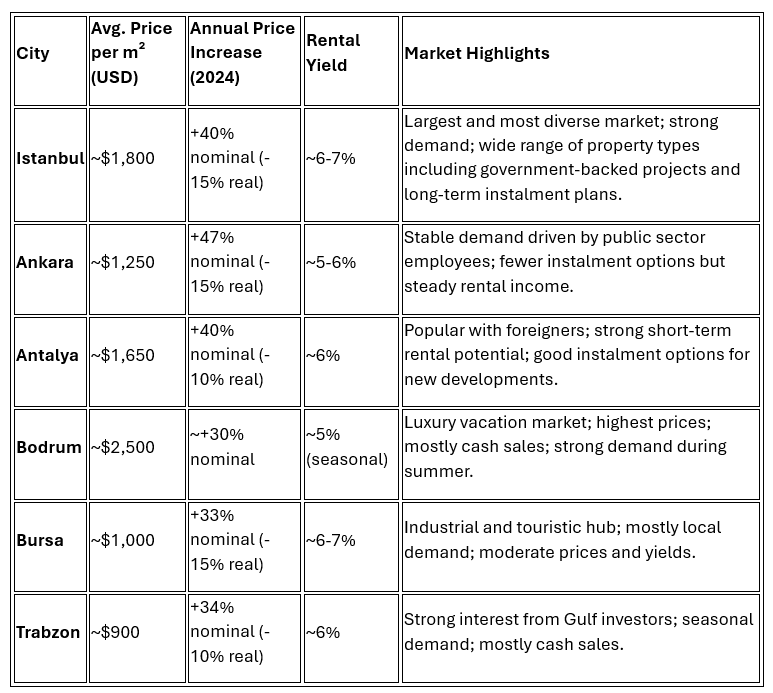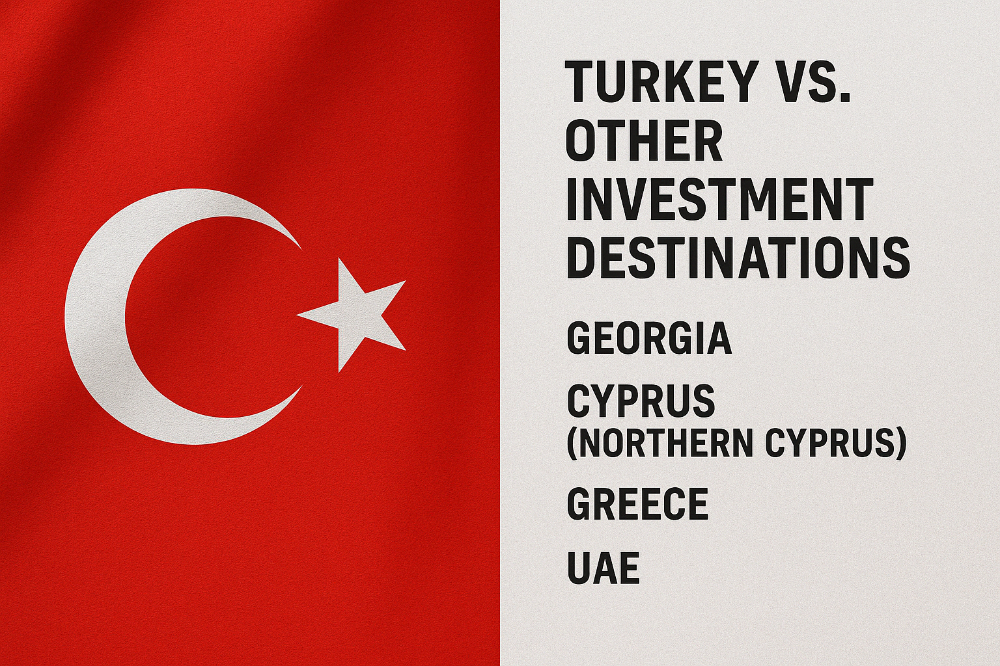
Analysis of the Turkish Real Estate Market: Outlook for the Next Five Years
General Forecast for the Turkish Real Estate Market Until 2030
Current data indicates that the Turkish real estate market will continue to grow in nominal prices over the coming years. However, it’s important to distinguish between nominal growth and real growth. While Turkey recorded one of the highest annual nominal price increases globally (about 46.4%), real prices have declined by about 14% per year due to high inflation. In other words, although property prices have risen sharply in Turkish lira, the actual purchasing power of these assets has declined. Still, nominal prices are expected to continue rising due to strong domestic demand and limited supply, while real price increases will depend on inflation control.
From a macroeconomic perspective, the Turkish government has shifted to tighter fiscal and monetary policies since mid-2023 to fight inflation. The official Medium-Term Economic Plan targets a reduction in inflation from over 50% to single-digit levels (around 9.7%) by 2026. Credit rating agencies have responded positively—both Fitch and S&P upgraded Turkey's ratings in 2024, reflecting improved fiscal discipline and growing reserves. These developments suggest that, if economic reforms stay on track, we may see a gradual decline in inflation by 2030, leading to greater currency stability and restored investor confidence.
On the supply and demand side, housing production currently falls short of meeting Turkey’s annual housing needs. Industry experts estimate that only about half the annual housing demand is being met, due to rising construction costs and fewer new housing starts. This supply shortage will likely continue to support property prices despite economic fluctuations. On the other hand, foreign demand peaked in 2022 but dropped significantly in 2023–2024 due to new residency restrictions and a higher minimum investment amount for Turkish citizenship (from $250,000 to $400,000). In 2024, foreign purchases accounted for just 1.6% of total property transactions, down from 3–5% in prior years. However, this demand is expected to recover gradually as inflation cools and the lira stabilizes.
Looking ahead to 2030, the Turkish real estate market is expected to remain strong due to fundamental drivers like a large, young population, urban migration, continued infrastructure investments, and tourism in coastal cities. If the government succeeds in reducing inflation to single digits, investors may enjoy both nominal and real capital gains. If inflation persists, price gains may remain largely nominal, offering limited real return for investors. Overall, the prevailing outlook is that the Turkish market will experience greater economic stability and stronger investor confidence by 2026 and beyond.
Best Time to Buy Property in Turkey (5-Year Investment Horizon)
Timing is crucial for maximizing returns. Given current conditions, 2024 to 2025 may be an ideal entry point for long-term investors. Following the rapid price surges in 2021–2022, the market entered a period of relative calm and price correction in 2023–2024. Although prices continue to rise in nominal terms, real prices have declined, offering better value. Additionally, high local interest rates (over 30%) have reduced local buyers’ borrowing power, resulting in less competition and more negotiation leverage for cash buyers.
In some areas, such as Alanya (a coastal city with previously high foreign demand), foreign purchases have slowed, leading to attractive deals in the resale market. Projects under construction are now being resold at discounted prices by investors needing liquidity, providing opportunities to buy below market value.
Why is 2024–2025 favorable?
- High interest rates limit demand from local buyers using credit, giving cash investors more bargaining power.
- Inflation is easing, down from a peak of 85% in 2022 to around 52% in mid-2024.
- A new growth cycle is expected after 2025, with forecasts of lower interest rates and increased demand.
- Some sectors and regions are in a temporary correction phase, such as luxury housing in Istanbul and coastal properties in Antalya.
In summary, for long-term investors, entering during this “quiet” period can be strategic, allowing them to benefit from the next wave of market recovery expected from 2026 onwards.
Comparative Analysis of Investment Potential in Key Turkish Cities
Here’s a comparison of Istanbul, Ankara, Antalya, Bodrum, Bursa, and Trabzon in terms of property prices, rental yields, demand, and available property types.

Payment Options
Cash payments provide the best negotiation leverage and often receive a 5–15% discount.
Installments are widely available in new developments, especially in Istanbul and Antalya. Typical plans involve 30–50% down payment and the rest over 12–36 months interest-free.
Government-backed projects offer long-term installment options (up to 10 years) and greater reliability.
Economic Climate: Favorable or Risky for Investors?
Turkey's recent economic reforms are focused on restoring macroeconomic stability. The combination of high interest rates and tightened monetary policy has led to:
- Reduced domestic demand, making the market more favorable for cash investors.
- Lower inflation expectations, which may boost confidence and lead to real price gains in the future.
- Improved currency stability, which is critical for international investors measuring returns in foreign currencies.
If the government successfully reduces inflation and maintains a stable currency, investors entering the market in 2024–2025 could benefit from strong real returns by 2030. However, if inflation persists or political factors disrupt the current trajectory, returns may remain nominal.
International Agencies' Outlook on Turkish Real Estate
Leading international organizations have become increasingly positive about Turkey's economic future:
- IMF: Commended Turkey’s shift to tight monetary policy, projecting inflation to fall to 24% in 2025 and economic growth to stabilize around 4% annually.
- World Bank: Forecasts continued growth and inflation moderation, noting the post-earthquake reconstruction drive as a key factor for ongoing construction activity.
- Fitch & S&P: Upgraded Turkey’s credit rating, citing improving reserves, tighter policy, and no elections until 2028.
- Moody’s: Issued Turkey’s first rating upgrade in 11 years, recognizing effective policy shifts and renewed investor confidence.
Overall, international sentiment suggests that Turkey is regaining economic credibility, making its real estate sector more attractive for foreign investment.

Turkey vs. Other Investment Destinations
How does Turkey compare to alternatives like Georgia, Northern Cyprus, Greece, and the UAE?
- Georgia: Offers high yields and a stable currency, but limited market depth. Turkey has a larger, more diverse economy and stronger long-term growth potential.
- Northern Cyprus: Lower entry costs and flexible ownership laws but comes with political risks and limited liquidity. Turkey offers broader opportunities and international legitimacy.
- Greece: More stable and part of the EU, but lower rental yields and higher entry costs. Turkey offers better returns and easier access to citizenship.
- UAE: Very stable and tax-free with high liquidity, but property prices are significantly higher. Turkey remains attractive due to lower prices, citizenship incentives, and growth potential.
Turkish Real Estate Tax System: Attractive or Not?
Turkey’s tax system for property investors is relatively mild compared to many countries:
- Title Deed Transfer Tax: 4% of the sale price (usually paid by the buyer).
- VAT: Up to 18% on new properties; foreigners can be exempt if buying in foreign currency and holding the property for at least one year.
- Annual Property Tax: ~0.1–0.2% of assessed value—very low by international standards.
- Rental Income Tax: Progressive, from 15% to 40%, but with annual exemptions and deductible expenses.
- Capital Gains Tax: Exempt if the property is held for more than 5 years. Otherwise, taxed progressively on adjusted profit.
- No wealth tax or inheritance tax specific to foreign property holders.
- Government incentives include tax breaks and long-term installment plans for certain projects.
Conclusion
Turkey offers a combination of high potential returns, affordable entry prices, and improving macroeconomic indicators. While short-term volatility remains, the medium- to long-term outlook is increasingly positive, especially for investors with a 5-year horizon. With its diverse markets, growing economy, and relatively low taxes, Turkey remains one of the most attractive emerging real estate markets globally.
Related Articles

Escrow Accounts in Dubai: How They Protect Your Real Estate Investment
Dubai has become one of the world’s most attractive destinations for real estate investors. With strong government regulations, clear processes, and transparent systems, property buyers often ask: Is real estate investment in Dubai safe? One of the key answers lies in the Escrow account system. This article explains what an Escrow account is, how it protects buyers, and why it plays a major role in reducing risk in Dubai’s property market.

Residence Permits in Dubai Through Real Estate Investment: Everything You Need to Know
Dubai continues to be one of the most attractive destinations globally for real-estate investment — not only because of its world-class infrastructure and tax-friendly environment, but also because foreign investors can secure residence permits via property ownership. This article outlines the two main investment-linked residence routes in Dubai, details their requirements, explains how each works and highlights recent regulatory enhancements from the UAE government.

Dubai 2040 Urban Master Plan: A Vision That Will Reshape Real Estate Markets
Dubai has long been synonymous with bold urban planning, iconic architecture, and aggressive growth. The unveiling of Dubai’s 2040 Urban Master Plan marks its latest leap into long-term thinking, combining sustainability, smart infrastructure, and population management into a two-decade roadmap. As real estate stakeholders—investors, developers, homebuyers—seek to align with future trends, the 2040 plan offers both opportunity and risk.
In this article, we’ll explore:
- What the Dubai 2040 plan broadly entails
- Key mechanisms by which it can influence real estate supply, demand, and pricing
- Projected effects on ROI across residential, commercial, and mixed-use sectors
- Strategic considerations and warnings for investors
- How to position yourself now to benefit
Comments (0)
You need to be logged in to comment